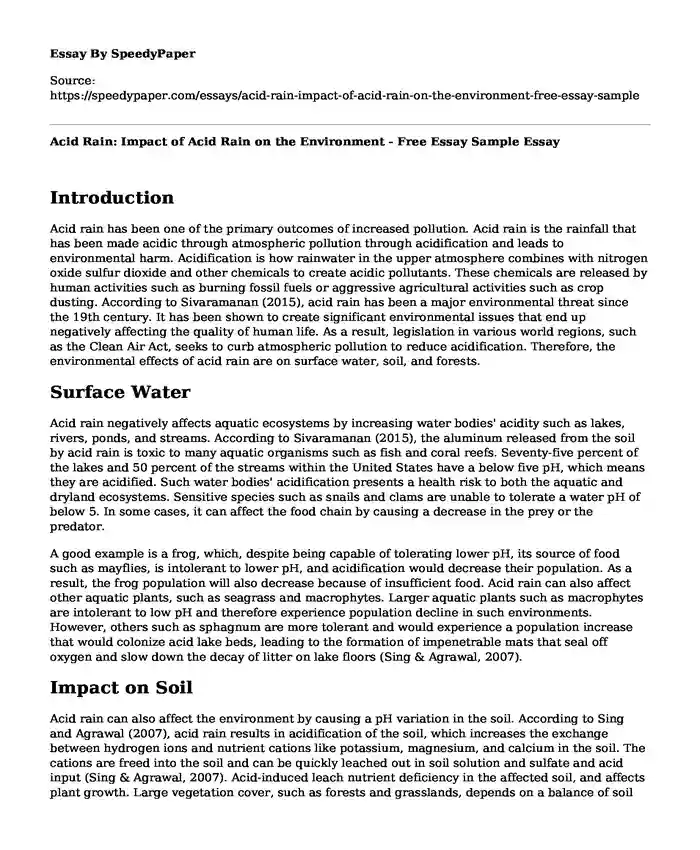
| Type of paper: | Essay |
| Categories: | Environment Ecology Water |
| Pages: | 4 |
| Wordcount: | 878 words |
Introduction
Acid rain has been one of the primary outcomes of increased pollution. Acid rain is the rainfall that has been made acidic through atmospheric pollution through acidification and leads to environmental harm. Acidification is how rainwater in the upper atmosphere combines with nitrogen oxide sulfur dioxide and other chemicals to create acidic pollutants. These chemicals are released by human activities such as burning fossil fuels or aggressive agricultural activities such as crop dusting. According to Sivaramanan (2015), acid rain has been a major environmental threat since the 19th century. It has been shown to create significant environmental issues that end up negatively affecting the quality of human life. As a result, legislation in various world regions, such as the Clean Air Act, seeks to curb atmospheric pollution to reduce acidification. Therefore, the environmental effects of acid rain are on surface water, soil, and forests.
Surface Water
Acid rain negatively affects aquatic ecosystems by increasing water bodies' acidity such as lakes, rivers, ponds, and streams. According to Sivaramanan (2015), the aluminum released from the soil by acid rain is toxic to many aquatic organisms such as fish and coral reefs. Seventy-five percent of the lakes and 50 percent of the streams within the United States have a below five pH, which means they are acidified. Such water bodies' acidification presents a health risk to both the aquatic and dryland ecosystems. Sensitive species such as snails and clams are unable to tolerate a water pH of below 5. In some cases, it can affect the food chain by causing a decrease in the prey or the predator.
A good example is a frog, which, despite being capable of tolerating lower pH, its source of food such as mayflies, is intolerant to lower pH, and acidification would decrease their population. As a result, the frog population will also decrease because of insufficient food. Acid rain can also affect other aquatic plants, such as seagrass and macrophytes. Larger aquatic plants such as macrophytes are intolerant to low pH and therefore experience population decline in such environments. However, others such as sphagnum are more tolerant and would experience a population increase that would colonize acid lake beds, leading to the formation of impenetrable mats that seal off oxygen and slow down the decay of litter on lake floors (Sing & Agrawal, 2007).
Impact on Soil
Acid rain can also affect the environment by causing a pH variation in the soil. According to Sing and Agrawal (2007), acid rain results in acidification of the soil, which increases the exchange between hydrogen ions and nutrient cations like potassium, magnesium, and calcium in the soil. The cations are freed into the soil and can be quickly leached out in soil solution and sulfate and acid input (Sing & Agrawal, 2007). Acid-induced leach nutrient deficiency in the affected soil, and affects plant growth. Large vegetation cover, such as forests and grasslands, depends on a balance of soil acidity. An increase in soil acidity could lead to soil biodiversity loss, which would encourage other processes such as erosion.
There is also evidence to indicate that the decomposition process is negatively affected by acid rain. Strong acidification reduces the decomposition of litter, spruce, birch, pine, and other cellulose-rich materials (Sing & Agrawal, 2007). Such processes are vital for the balance of the ecosystem. The current generation may not immediately feel the impacts of reduced decomposition of such materials, but future vegetation will have insufficient nutrients to grow.
Impact on Forests
Acid rain can affect forests directly through individual plants, or indirectly through affecting the soil. As discussed in the previous section, acid rain results in lower soil fertility, reducing the vegetation cover (Singh & Agrawal, 2007). However, Sivaramanan (2015) indicates that acid precipitation on vegetation leaves reduces the plant's photosynthesis and growth. Also, acid rain increases plants' susceptibility to drought and diseases through a process known as 'dieback' which is characterized by the browning of the leaf. Such impacts by acid rain reduce forests' ability to purify the air and hence increase the amount of Carbon Dioxide in the air.
Furthermore, acid rain also causes a reduction in biomass. According to Sivaramanan (2015), acid rain is responsible for thinning the annual growth rings and damaging the delicate root system. The thinning of the annual growth rings means the trees have reduced growth and are not storing as much carbon as possible. The effect on the root system also reduces the trees' ability to absorb water from the soil and support themselves.
Conclusion
The release of harmful gasses into the atmosphere by humans is the leading cause of acid rain. Acid rain affects the environment by acidifying various ecosystems such as surface water, soil, and forest regions. These ecosystems are essential for the sustainability of life on Earth, and the destruction of one or all of them would hurt animal life. Therefore, reduced emissions of harmful gasses are the first and direct way of countering acidification.
References
Singh, A., & Agrawal, M. (2007). Acid rain and its ecological consequences. Journal of Environmental Biology, 29(1), 15. http://www.jeb.co.in/journal_issues/200801_jan08/paper_02.pdf
Sivaramanan, S. (2015). Acid rain, causes, effect, and control strategies. Central Environmental Authority, Battaramulla, DOI. https://www.researchgate.net/profile/Sivakumaran_Sivaramanan2/publication/275344491_ACID_RAIN_CAUSES_EFFECTS_AND_CONTROL_STRATEGIES/links/553a3e250cf2c415bb073249.pdf
Cite this page
Acid Rain: Impact of Acid Rain on the Environment - Free Essay Sample. (2023, Dec 22). Retrieved from https://speedypaper.com/essays/acid-rain-impact-of-acid-rain-on-the-environment-free-essay-sample
Request Removal
If you are the original author of this essay and no longer wish to have it published on the SpeedyPaper website, please click below to request its removal:
- Industrial Revolution Essay Sample
- Ecological Issues in This Free Essay Example
- Essay Example on Environmental Management System
- Essay Sample: Mekong River and Environmental Concerns
- Essay Sample on Analysis on the Effects of Population Growth
- Essay Sample: Amount of Energy Needed in the US
- Paper Example. Climate Change and Agriculture in Europe
Popular categories




